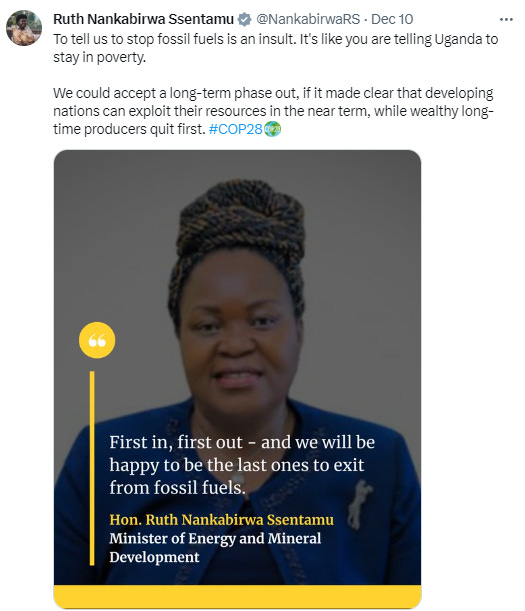![]()

by Roger Pielke Jr.
International climate policy under the UN Framework on Climate Change (UNFCCC) has not led to any discernible effects on carbon dioxide emissions, as I showed here last week. The results of the 28th Conference of Parties (COP28) to the UNFCCC is not going to have any effects either, though you will surely hear a lot about it from the 4,000 journalists attending in person.
The simple explanation for this track record of failure is that the UNFCCC pits the rich world against everyone else — some 6+ billion people around the world who legitimately want to achieve global economic and energy equity.
Few people know or remember that the UNFCCC as originally agreed in 1992 at the Rio Earth Summit included an explicit emissions reduction target:
Each of these Parties shall adopt national policies and take corresponding measures on the mitigation of climate change, by limiting its anthropogenic emissions of greenhouse gases . . . with the aim of returning individually or jointly to their 1990 levels these anthropogenic emissions of carbon dioxide and other greenhouse gases not controlled by the Montreal Protocol.
In 1990 total global carbon dioxide emissions from the burning of fossil fuels was about 21.3 gigatonnes, or about 40% less than in 2023. If the world in 2023 was at that level we’d be well ahead of the emissions reductions implied by the Paris Agreement to be consistent with the 1.5 degrees Celsius temperature target for 2100.
Let’s take a look at those countries that have met the 1992 UNFCCC emissions reduction target of returning to 1990 levels.

These 35+ countries are comprised of former Soviet republics, Japan, United Kingdom, and almost all of Europe. Setting aside the former Soviet states, which achieved their emissions reductions due to the collapse of the USSR, the club of countries that has succeeded with respect to the climate targets of the UNFCCC is highly selective — US, Japan and Europe.
The figure below shows a list of countries that have not met the 1990 target of the UNFCCC.

The UNFCCC recognized key differences between countries:
1. The Parties should protect the climate system for the benefit of present and future generations of humankind, on the basis of equity and in accordance with their common but differentiated responsibilities and respective capabilities. Accordingly, the developed country Parties should take the lead in combating climate change and the adverse effects thereof.
2. The specific needs and special circumstances of developing country Parties, especially those that are particularly vulnerable to the adverse effects of climate change, and of those Parties, especially developing country Parties, that would have to bear a disproportionate or abnormal burden under the Convention, should be given full consideration.
The UNFCCC even grouped countries into different categories based mainly on their levels of wealth.
Here then is the design flaw in the entire project: The rich countries are well on their way to successful climate mitigation, at least as expressed under the emissions target of the 1992 UNFCCC and its 2015 Paris Agreement. That means to get on track the burden of effort must come from everyone else.
This is exactly what you find in the scenarios of the IPCC AR6:
The IPCC AR6 scenarios disregard both the historical responsibility of the global North for carbon emissions as well as the future energy needs of the global South required to meet developmental goals. The burden of climate change mitigation is placed squarely on less developed countries, while developed countries continue to increase their energy consumption unhindered by constraints on the use of fossil fuels.
At COP28, Ruth Nankabirwa Ssentamu, Ugandan Minister of Energy and Mineral Development, called out the hypocrisy, telling rich countries to “go first” on phasing out fossil fuels:

She is right.
Here is the bottom line: The UNFCCC is a neocolonial relic. It perpetuates and even encourages a split between the globally rich (and powerful) and everyone else. This approach is never going to work — and certainly not by seeking to achieve a global consensus on the immediate phase down/out of fossil fuels, without parallel commitments to expanding access to energy services and economic growth.


And China, close to being the largest economy in the world, is considered a “developing country” and given a complete pass, even as they are creating soon to be the most powerful military in the world.
It’s a great big hypocritical joke.